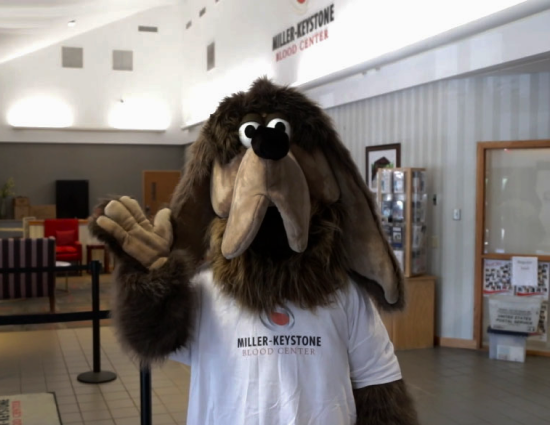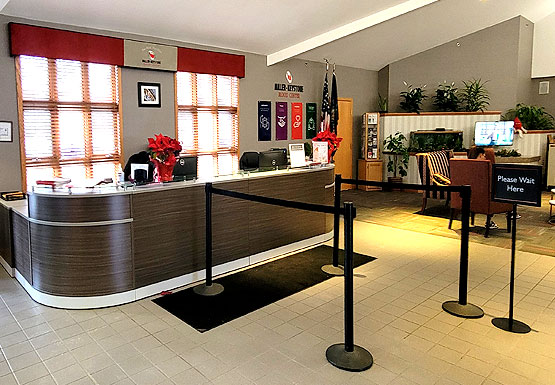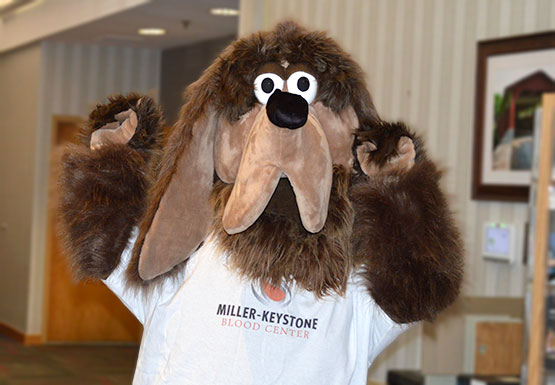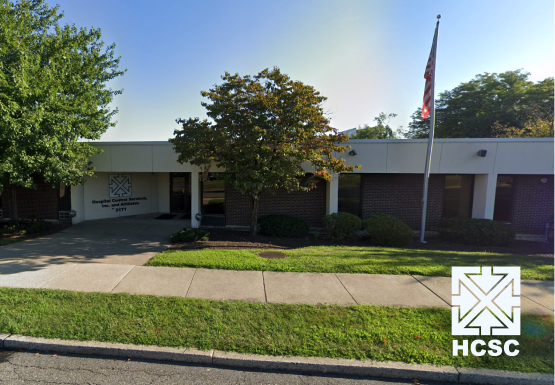On September 12, a blood bank is founded in Reading, PA, as the Blood Bank of Berks County through cooperative efforts of the Berks County Medical Society and the Reading Host Lions Club; offices are established in downtown Reading (PA), with donors donating at one of the three local hospitals (Reading Hospital & Medical Center, Community General Hospital, St. Joseph Medical Center). The Blood Bank’s name is later changed to Keystone Community Blood Bank (KCBB).
The dedication ceremony for the new Samuel W. Miller Memorial Blood Center (MMBC) takes place on September 9th and the first unit of blood is collected the following day. The first hospitals to participate were St. Luke’s Hospital and Muhlenberg Hospital Center followed by Easton Hospital a month later. Before the years end, the Center was supplying blood and blood products to Allentown Hospital, Allentown Osteopathic Medical Center, and Sacred Heart Hospital.
An accredited reference laboratory where difficult transfusion problems and identification of rare donor units are resolved was established. A rare donor registry is created and is made accessible to blood centers across the country.
Quakertown Community Hospital becomes the eighth hospital served by MMBC.
A frozen red cell program which allows the storage of rare blood units is developed by MMBC. Keystone Community Blood Bank begins to develop plans for mobile blood collection services.
The first KCBB field hospital bloodmobile is held in January, with collected blood tested and prepared for transfusion at local hospitals.
A new blood bag preservative is introduced extending the shelf life of blood from 21 to 35 days.
Donor screening for HIV antibody is initiated at MMBC. A self-contained bloodmobile is purchased by KCBB to collect blood at sites that are not able to host on-site blood drives due to space limitations or number of donors, and administrative offices are moved to a location in Bern Township.
A new blood bag preservative allows blood to be stored up to 42 days. A decision is made to build a new facility and a 1.2 million dollar capital campaign is launched in August. On November 29, a ground- breaking ceremony is held at the site of the new MMBC in the Lehigh Valley Corporate Center.
On January 15, a new 32,000 square foot Miller Memorial Blood Center opens at the Valley Center Parkway, Bethlehem, in the Lehigh Valley Corporate Center. MMBC begins an apheresis (platelet) program on September 25th.
A self-contained bloodmobile coach is purchased by MMBC to collect blood at sites unable to host on- site bloodmobiles because of space limitations or number of donors. MMBC is licensed for blood collection in the state of New Jersey. Hackettstown Community Hospital becomes the ninth hospital to affiliate with MMBC and the first hospital in New Jersey. Warren Hospital in Phillipsburg, New Jersey becomes the tenth hospital to join MMBC.
Therapeutic phlebotomy, the removal of specific volumes of blood to combat the symptoms of disease such as polycythemia vera, is now performed at Miller. Newton Memorial Hospital, Newton, New Jersey, becomes the eleventh hospital to join MMBC’s program.
Miller Memorial Blood Center implements a sophisticated data management system. The new system, approved by the FDA, integrates donor product and distribution information for quality, safety and process control for both donors and blood products. On October 1st, Pottstown Memorial Medical Center joins MMBC’s blood service program.
On October 6, an affiliation is announced between Miller Memorial Blood Center, Keystone Community Blood Bank, and Central Pennsylvania Blood Center of Hummelstown, PA. MMBC launches a website, located at www.mmbc.org/blood. KCBB’s donor center is moved to the Community Campus of St. Joseph Medical Center.
MMBC is licensed for donor retested plasma. Palmerton Hospital joins Miller’s blood service program.
Miller is awarded a contract with a national wound care center for testing of their blood samples. MMBC is licensed to collect leukoreduced pheresis platelets at the main facility and Cedar Crest satellite. The KCBB Board of Directors and the membership at large vote to approve a merger between MMBC and KCBB. The Board also approves creation of a donor center at the Bern Township office location.
Miller Memorial Blood Center becomes the fourth not-for-profit community blood organization in the United States to achieve the ISO9001 quality certification. Keystone Community Blood Bank (Reading, PA) merges into Miller Memorial Blood Center operations. KCBB’s newly constructed Mark S. Reed Donor Center is dedicated in January; whole blood donations are immediately collected, and an apheresis (platelet) program becomes operational in February.
A second self-contained bloodmobile coach is purchased by MMBC to meet increased demand for blood products and services in our region. Keystone Community Blood Bank establishes a web presence on the Blood Center’s site, located at www.hcsc.org/blood. In July, Gnaden Huetten Memorial Hospital, Lehighton, PA, joins MMBC’s blood service program.
On June 17, simultaneous press conferences are held in Bethlehem and Reading to announce the newly-merged name of Miller-Keystone Blood Center, and to unveil a new, unified logo for the organization. On July 1, St. Luke’s Miners Memorial Hospital (Coaldale, PA) joins the blood services program. Major construction activity takes place at the Bethlehem headquarters, including the establishment of a Nucleic Acid Testing (NAT) laboratory and the re-location and expansion of the collections area.
MKBC announces establishment of a new Donor Testing Services division, which will allow Miller-Keystone to test blood donor samples for both our region and other blood centers nationwide. A new self-contained bloodmobile coach and mini-bloodmobile coach are added to the Blood Center’s fleet of blood collection vehicles. The Allentown donor center moves into a larger space at 1255 S. Cedar Crest Boulevard in April, and in August, a new donor center is opened at 2925 William Penn Highway in Easton.
Effective Nov. 1, 2004, Miller-Keystone becomes the exclusive blood provider to the Greater Hazleton Health Alliance (Hazleton, PA). To provide donors in this region with more convenient opportunities to donate, a new fixed site donor center opens at The Beltway Commons, 132 Airport Road, Hazleton, in October.
A second mini-bloodmobile is added to the Blood Center’s fleet of blood collection vehicles.
In July, a new Blue Bird Forward Control Bloodmobile is added to the Blood Center’s fleet of blood collection vehicles.
Plainfield Volunteer Fire Company (Wind Gap) and MKBC partner to host weekly blood drives at the Fire Hall. These drives are held every Thursday, as well as every-other Tuesday.
To help ensure that MKBC continues to meet the complex challenges of providing a safe, stable and constant blood supply, the Blood Center establishes an Endowment Fund. All monies deposited into this fund are invested and continue to grow; the interest on this money is used for pressing service programs and technology needs.
The Blood Center adds the new Abbott Prism System into its Laboratory operations. This blood screening instrument consolidates many testing operations into a single, automated system, reducing the number of times a test sample is handled, improving operating safety and efficiency for the Blood Center.
Trinity Evangelical Lutheran Church (Quakertown) and MKBC partner to host monthly bloodmobile drives at the Church. These drives are held the third Monday of every month. This is increased to the first and third Monday of each month in 2010.
In December, MKBC adds a new test to screen blood donations for Chagas disease. This disease, common to Central and South America, is rare in the US; however recent immigration growth increases the potential risk factor for transmission.
Miller-Keystone Blood Center is named a “Center of Excellence” by Gambro BCT. One of three centers in the nation to receive this designation, MKBC serves as a model for use of the Vista Information System software.
In the spring, MKBC – along with blood centers throughout the country – implemented the ISBT128 labeling system. This system increases the level of standardization in transfusion medicine, and allows for every blood product to be specifically identified and tracked anywhere in the world.
In July, the new Angela Hohl Memorial Bloodmobile is added to the Blood Center’s fleet of blood collection vehicles.
In January, the Blood Center resumes complimentary cholesterol screening for blood donors. Previous cholesterol screening equipment was rendered obsolete in June 2008 because it was not compatible with a new industry-mandated labeling system.
The Blood Center announces that baby-sitting services are available while individuals donate blood. The pilot program began on Monday mornings and Wednesday evenings at MKBC’s Bethlehem location, with plans to expand the program to its Allentown, Easton and Reading sites as well.
The Blood Center ships units of blood to Haiti to support medical services provided after a devastating earthquake.
HLA (Human Leukocyte Antigen) testing is implemented, to identify what products can best be produced from a specific donor’s unit of blood. A 2nd Abbott Prism and a 2nd Biotest Tango (blood testing instruments) are interfaced with our blood bank management system, to help provide testing results in a more timely manner.
An agreement is signed with Northampton Community College to be a clinical site for students in the new Phlebotomy program. Students from The Reading Hospital Clinical Laboratory Program also visit the Blood Center for lecture and clinical training.
A new Quality Assurance software system is implemented to automate business processes, eliminate paperwork, and achieve compliance with regulatory agencies. A new Affirmative Action Plan for the Blood Center is completed, as part of an agreement with the Department of Defense to provide laboratory testing services.
Effective July 1, Miller-Keystone becomes the exclusive blood provider to Brandywine Hospital (Coatesville, PA) and Phoenixville Hospital (Phoenixville, PA); and effective September 1, Grand View Hospital (Sellersville, PA), joins the blood services program. This brings the number of customers served on a sole source basis to 21 hospitals in 10 PA and NJ counties.
MKBC opens a new donor center to serve residents in the Chester County (PA) area, located in the Lionville Shopping Center, 128 Eagleview Boulevard, Lionville.
Miller-Keystone’s Hazleton Donor Center begins bi-monthly platelet collections, on the first and third Friday of each month.
On July 1, Miller-Keystone Blood Center becomes the exclusive blood provider to Chestnut Hill Hospital (Philadelphia, PA).
In October 2011, the St. Luke’s Anderson Hospital opens in Easton, PA, bringing the number of customers served on a sole source basis to 23 hospitals in 11 PA and NJ counties.
On January 1, Miller-Keystone Blood Center becomes the exclusive blood provider to Jennersville Regional Hospital (West Grove, PA).
Effective September 1, MKBC is named as the service provider to Hunterdon Medical Center (Flemington, NJ), increasing the number of customers served to 25 hospitals in 12 PA and NJ counties.
Peter J. Castagna, Jr. is named as President & CEO, succeeding J. Michael Lee, DBA, FACHE who retires after a 33-year tenure.
On July 1, 2013, Miller-Keystone Blood Center becomes the exclusive blood supplier to Schuylkill Medical Center – South Jackson and Schuylkill Medical Center – East Norwegian in Pottsville, PA, bringing the numbers of customers served on a sole source basis to 27 hospitals in 12 PA and NJ counties.
Satellite locations are also added at the Hazle Township Commons building and at Western Pocono Community Library in Brodheadsville.
Online/internet portals are added for both blood donors and blood drive coordinators. Highlights of the portals include online scheduling for blood drives and our donor center locations, as well as the ability for donors to review their donation history and test results electronically.
A new Miller-Keystone Blood Center website is launched at GIVEaPINT.org. Features of the new site include improved navigation for easy access to information on donating blood, planning a blood drive, events and promotions, providing financial support, or becoming a volunteer.
MKBC implements iScreen, a secure internet-based system that allows a donor to answer his/her donor history questions confidentially. After completing the questionnaire, the donor prints out or emails to his/her smart phone a bar-coded ticket that contains their hidden responses, which they bring with them for their scheduled donation. The new iScreen process saves time, provides privacy, adds convenience and helps save the environment, as it is a paperless option.
The Blood Center launches its “Local Leader” campaign to recognize schools, businesses, church groups and other organizations who go above and beyond the call of duty to support their community. By hosting blood drives with MKBC and collecting a minimum of 200 donations during the year, the organizations are presented with a plaque and featured on the Blood Center’s website and social media.
Looking to attract more young donors, MKBC establishes its High School Hero Cord Program, which provides an opportunity for high school students to earn a red cord to wear at their graduation ceremony.
Effective December 1, Miller-Keystone becomes the exclusive blood provider to Penn State Milton S. Hershey Medical Center in Dauphin County.
MKBC launches its “Lifesaver Rewards” program and donor store, awarding donor points for each contribution made that can be redeemed in the store for a variety of items including gift cards, t-shirts, hats or coffee mugs. Points can also be contributed to MKBC’s Scholarship Program. A second rewards store for Blood Drive coordinators is also launched to recognize and reward the important role they serve as our Blood Drive sponsors and chairpersons.
New iTable technology is piloted at the Bethlehem Donor Center. The iTables, complete with a PC tablet and work space, enable automated donors to have the flexibility to watch a movie, check email or surf the net during their donation process.
MKBC announces its “Celebrate Hope” campaign, which seeks to unite local transfusion recipients with the blood donors who helped save their lives.
MKBC’s Student Volunteer Scholarship award is renamed in honor of two of its most dedicated volunteers, Bill and Jackie Younger of Catasauqua (PA). Bill and Jackie were both devoted volunteers who donated more than 25,000 hours of service to the Blood Center. In addition to their volunteer service, they were both dedicated blood donors, having donated more than 43 gallons, saving the lives of thousands in our community.
Miller-Keystone becomes the exclusive blood provider to the St. Luke’s University Health Network’s new hospital located in Monroe County.
MKBC completes installation of the Vista project, with is designed to automate blood loss tracking by reducing human error and product attrition, while also improving access to reporting.
Miller-Keystone Blood Center assumes donor recruitment and blood collection activities in the Trenton, NJ area previously served by the Community Blood Council of New Jersey (CBCNJ), including oversight of a donor center at 1410 Parkside Avenue, Ewing Township.
Miller-Keystone Blood Center, in collaboration with Central Pennsylvania Blood Bank and New York Blood Center, is announced as blood supplier to the Geisinger health system, which includes six (6) hospitals in Northeast Pennsylvania.
The Blood Center establishes its “Adopt-a-Day” program, which enables smaller groups/organizations who do not have the necessary space available to run a blood drive or the minimum number of individuals available to donate on-site to host a blood drive at an MKBC donor center instead. This provides the organization’s employees, family and friends to give the gift of life while the sponsoring organization is recognized in the community.
To accommodate blood donors in MKBC’s Northeast Pennsylvania region, a donor center location is added in Pittston, PA. The location includes three (3) donor chairs for whole blood collections and three (3) chairs for automated collections (red cells, platelets or plasma).
The COVID-19 pandemic forces blood centers across the nation, including MKBC, to implement modifications to many of their practices and procedures. This includes the temporary suspension of on-site bloodmobile drives, changes to scheduling practices to adhere to social distancing recommendations, and temporarily adopting an appointment-only policy.
In response to the coronavirus pandemic, MKBC establishes its Convalescent Plasma Program (CCP). When a person becomes ill with COVID-19, it can take a patient time to develop antibodies needed to combat the disease. Post-recovery, these patients have these antibodies in their plasma. By collecting this plasma and giving it to critically ill coronavirus patients, the goal is to provide a boost to the patient’s antibodies and help stimulate recovery. While experimental, the FDA announced the emergency authorization of Convalescent Plasma to treat COVID19 patients on August 23, 2020.
A ribbon-cutting is held for MKBC’s newest bloodmobile vehicle, which was made possible through the generosity of the Air Products Foundation.
MKBC updates and re-launches its High School Hero Blood Donor Recruitment Scholarship opportunity, which guarantees a scholarship award for any participating high school that achieves a minimum of 50 points annually.



